
Hassan Ibrahim
Calls were made Saturday night urging doctors to show up at hospitals at 8am to prevent hospital administrations from selling tickets to patients, as part of the escalation their partial strike.
“Today is the seventh day of our partial strike and as part of the strike, we don’t run the outpatient clinics which are normally closed only on Fridays but we are running everything else that patients may need,” said Mohamed Shafiq, a member of the press committee in the elected committee tasked with the administration and negotiation of the strike.
During the strike, “we examine all the patients for free in the reception rather than have them pay for outpatient clinics,” he said. Shafiq explained that this way, they can advance their demands without harming patients.
“This way, we’ve cost the Ministry of Health what they say is EGP 25 million but the number is probably much larger, it might be EGP 40 or 50 million,” he speculated.
“Their strategy was to sell tickets to patients even if the doctors were not working, so that the patient would go to the doctor and say ‘I’ve paid so I want services,’… the doctors are going to the hospitals to explain to the patients that they can get examined for free at the reception department…. they are trying to pit the patients against the doctors,” he added.
Ahmed Hussein, one of two doctors who started, then aborted, a hunger strike last month, threatened to do so again on 15 October if the strike’s demands were not met. One of the doctors elected to the committee governing the strike, Hussein claimed that before the strike, “most emergency and reception departments in hospitals charged patients which is illegal.”
Hussein said all hospital departments are running except for the outpatient clinics. “It’s just like a Friday,” he said. “The departments are running and we are the ones offering patients services for free.”
The partial strike does not include receptions, emergency departments, intensive care units, incubators, kidney dialysis, and the oncology departments. It includes state-run Ministry of Health hospitals but doesn’t include university, armed forces or police hospitals.
Shafiq said this latest move is part of escalatory steps being taken by striking doctors. The third step of escalation will be a campaign to collect resignations Shafiq said.
Group resignations will be collected starting next week but will not be handed in until they reach a minimum of 15,000 resignations, according to a statement released by the committee managing the strike. The committee convened in a five-hour emergency meeting on Friday.
The statement thanked all the doctors who took part in the strike and followed the protocol agreed upon at the general assembly held by the Doctors’ Syndicate last month. The statement said this has come “in spite of desperate attempts by ministry officials and their aides to abort the strike which have failed.”
It also said that starting this week doctors will be holding a protest in front of large hospitals in every governorate every Tuesday at noon. The point is to inform the public of the purpose of the strike, which the committee said was being “held in the interests of patients.”
The strike started at the start of the month after a meeting of the general assembly of the Doctors’ Syndicate which convened in September.
The syndicate is demanding a minimum salary of EFP 3,000 per month, more security in hospitals and the portion of the budget allocated to healthcare increased from the current less than five per cent to 15 per cent. Ultimately, the doctors say they want to see improvements in the level and quality of health care offered to patients.
The Doctors’ Syndicate released a statement on Saturday claiming to be “the only representative of Egypt’s doctors and the board of the general syndicate and the boards of the sub-syndicates are the only respectable body which governs the strike.”
The statement also said that while doctors have the right to strike, they also have the right to work.
This statement did not sit well with some of the striking doctors. Hussein said the statement made by the Doctors’ Syndicate offered, “flexibility when it comes to following the procedures for the strike which they do not have the right to offer because the procedures were clearly highlighted in the general assembly.”
The statement made by the syndicate highlights an ongoing dispute which broke out when the general assembly of the syndicate convened on 21 September. When it was time to set up the committee tasked with negotiating and managing the strike, the chairman of the syndicate, Khairy Abdel-Dayem and many board members left as they wanted the committee to include them.
After they left, the assembly resumed. A committee was then elected by over 1,000 doctors in the assembly. However the board of the syndicate did not recognise the committee. Despite this, most doctors are following the elected committee.
According to the advocacy group Doctors without Rights, doctors declined the suggestion of a full strike during the general assembly.

